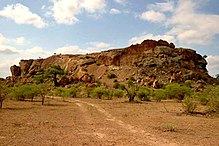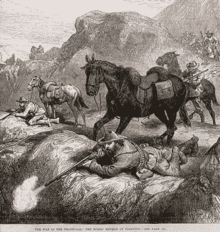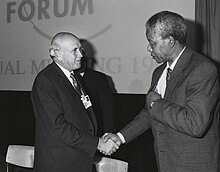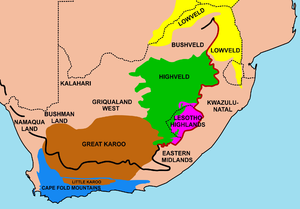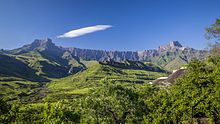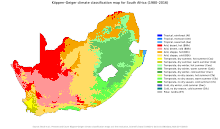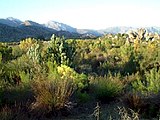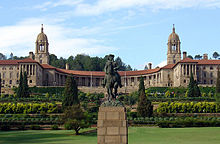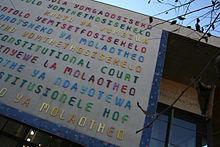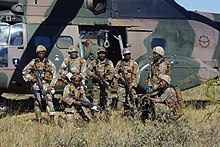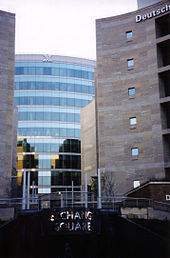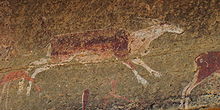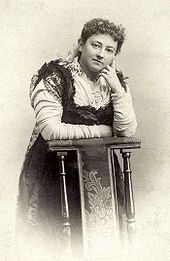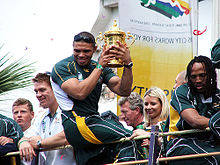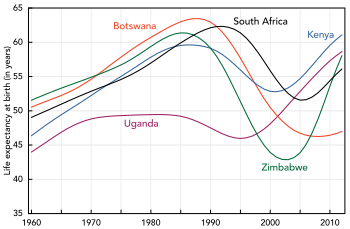Republic of South Africa
| |
|---|---|
Motto: "ǃke e꞉ ǀxarra ǁke" (ǀXam)
"Unity in Diversity" | |
Anthem: "National anthem of South Africa"
| |
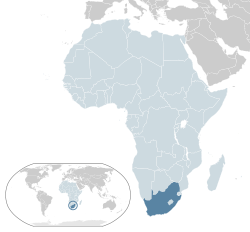
Location of South Africa (dark blue)
in the African Union (light blue)
| |
 | |
| Capital |
|
| Largest city | Johannesburg |
| Official languages | 11 languages: |
| Recognised regional languages | |
| Ethnic groups
(2014[3])
| |
| Religion | See Religion in South Africa |
| Demonym(s) | South African |
| Government | Unitary dominant-party parliamentary constitutional republic |
| Cyril Ramaphosa | |
| David Mabuza | |
| Legislature | Parliament |
| National Council | |
| National Assembly | |
| Independence
from the United Kingdom
| |
• Union
| 31 May 1910 |
| 11 December 1931 | |
• Republic
| 31 May 1961 |
| 4 February 1997 | |
| Area | |
• Total
| 1,221,037 km2 (471,445 sq mi) (24th) |
• Water (%)
| 0.380 |
| Population | |
• 2018 estimate
| 57,725,600 (24th) |
• 2011 census
| 51,770,560 |
• Density
| 42.4/km2 (109.8/sq mi) (169th) |
| GDP (PPP) | 2019 estimate |
• Total
| $819 billion (30th) |
• Per capita
| $14,042 (90th) |
| GDP (nominal) | 2019 estimate |
• Total
| $386 billion (35th) |
• Per capita
| $6,609 (88th) |
| Gini (2014) | very high |
| HDI (2017) | medium · 113th |
| Currency | South African rand (ZAR) |
| Time zone | UTC+2 (SAST) |
| Driving side | left |
| Calling code | +27 |
| ISO 3166 code | ZA |
| Internet TLD | .za |
South Africa, officially the Republic of South Africa (RSA), is the southernmost country in Africa. It is bounded to the south by 2,798 kilometres (1,739 mi) of coastline of Southern Africa stretching along the South Atlantic and Indian Oceans; to the north by the neighbouring countries of Namibia, Botswana, and Zimbabwe; and to the east and northeast by Mozambique and Eswatini (Swaziland); and it surrounds the enclaved country of Lesotho. South Africa is the largest country in Southern Africa and the 25th-largest country in the world by land area and, with over 57 million people, is the world's 24th-most populous nation. It is the southernmost country on the mainland of the Old World or the Eastern Hemisphere. About 80 percent of South Africans are of Bantu ancestry, divided among a variety of ethnic groups speaking different African languages, nine of which have official status. The remaining population consists of Africa's largest communities of European, Asian (Indian), and multiracial (Coloured) ancestry.
South Africa is a multiethnic society encompassing a wide variety of cultures, languages, and religions. Its pluralistic makeup is reflected in the constitution's recognition of 11 official languages, which is the fourth highest number in the world. Two of these languages are of European origin: Afrikaans developed from Dutch and serves as the first language of most coloured and white South Africans; English reflects the legacy of British colonialism, and is commonly used in public and commercial life, though it is fourth-ranked as a spoken first language. The country is one of the few in Africa never to have had a coup d'état, and regular elections have been held for almost a century. However, the vast majority of black South Africans were not enfranchised until 1994. During the 20th century, the black majority sought to claim more rights from the dominant white minority, with this struggle playing a large role in the country's recent history and politics. The National Party imposed apartheid in 1948, institutionalising previous racial segregation. After a long and sometimes violent struggle by the African National Congress (ANC) and other anti-apartheid activists both inside and outside the country, the repeal of discriminatory laws began in the mid-1980s.
Since 1994, all ethnic and linguistic groups have held political representation in the country's liberal democracy, which comprises a parliamentary republic and nine provinces. South Africa is often referred to as the "rainbow nation" to describe the country's multicultural diversity, especially in the wake of apartheid. The World Bank classifies South Africa as an upper-middle-income economy, and a newly industrialised country. Its economy is the second-largest in Africa, and the 34th-largest in the world. In terms of purchasing power parity, South Africa has the seventh-highest per capita income in Africa. However, poverty and inequality remain widespread, with about a quarter of the population unemployed and living on less than US$1.25 a day. Nevertheless, South Africa has been identified as a middle power in international affairs, and maintains significant regional influence.
Name
The name "South Africa" is derived from the country's geographic location at the southern tip of Africa. Upon formation, the country was named the Union of South Africa in English and Unie van Zuid-Afrika in Dutch, reflecting its origin from the unification of four formerly separate British colonies. Since 1961, the long form name in English has been the "Republic of South Africa" and Republiek van Suid-Afrika in Afrikaans. Since 1994, the Republic has had an official name in each of its 11 official languages.Mzansi, derived from the Xhosa noun umzantsi meaning "south", is a colloquial name for South Africa, while some Pan-Africanist political parties prefer the term "Azania".
History
Prehistoric archaeology
South Africa contains some of the oldest archaeological and human-fossil sites in the world. Archaeologists have recovered extensive fossil remains from a series of caves in Gauteng Province. The area, a UNESCO World Heritage site, has been branded "the Cradle of Humankind". The sites include Sterkfontein, one of the richest sites for hominin fossils in the world. Other sites include Swartkrans, Gondolin Cave Kromdraai, Coopers Cave and Malapa. Raymond Dart identified the first hominin fossil discovered in Africa, the Taung Child (found near Taung) in 1924. Further hominin remains have come from the sites of Makapansgat in Limpopo Province, Cornelia and Florisbad in the Free State Province, Border Cave in KwaZulu-Natal Province, Klasies River Mouth in Eastern Cape Province and Pinnacle Point, Elandsfontein and Die Kelders Cave in Western Cape Province.These finds suggest that various hominid species existed in South Africa from about three million years ago, starting with Australopithecus africanus. There followed species including Australopithecus sediba, Homo ergaster, Homo erectus, Homo rhodesiensis, Homo helmei, Homo naledi and modern humans (Homo sapiens). Modern humans have inhabited Southern Africa for at least 170,000 years.
Migrations that formed the modern Rainbow nation
Various researchers have located pebble tools within the Vaal River valley.
Bantu expansion
Mapungubwe Hill, the site of the former capital of the Kingdom of Mapungubwe
Settlements of Bantu-speaking peoples, who were iron-using agriculturists and herdsmen, were already present south of the Limpopo River (now the northern border with Botswana and Zimbabwe) by the 4th or 5th century CE. They displaced, conquered and absorbed the original Khoisan speakers, the Khoikhoi and San peoples. The Bantu slowly moved south. The earliest ironworks in modern-day KwaZulu-Natal Province are believed to date from around 1050. The southernmost group was the Xhosa people, whose language incorporates certain linguistic traits from the earlier Khoisan people. The Xhosa reached the Great Fish River, in today's Eastern Cape Province. As they migrated, these larger Iron Age populations displaced or assimilated earlier peoples.
In Mpumalanga Province, several stone circles have been found along with the stone arrangement that has been named Adam's Calendar.
Portuguese contacts
At the time of European contact, the dominant ethnic group were
Bantu-speaking peoples who had migrated from other parts of Africa about
one thousand years before. The two major historic groups were the Xhosa
and Zulu peoples.
In 1487, the Portuguese explorer Bartolomeu Dias led the first European voyage to land in southern Africa. On 4 December, he landed at Walfisch Bay (now known as Walvis Bay in present-day Namibia). This was south of the furthest point reached in 1485 by his predecessor, the Portuguese navigator Diogo Cão (Cape Cross,
north of the bay). Dias continued down the western coast of southern
Africa. After 8 January 1488, prevented by storms from proceeding along
the coast, he sailed out of sight of land and passed the southernmost
point of Africa without seeing it. He reached as far up the eastern
coast of Africa as, what he called, Rio do Infante, probably the present-day Groot River, in May 1488, but on his return he saw the Cape, which he first named Cabo das Tormentas (Cape of Storms). His King, John II, renamed the point Cabo da Boa Esperança, or Cape of Good Hope, as it led to the riches of the East Indies. Dias' feat of navigation was later immortalised in Luís de Camões' Portuguese epic poem, The Lusiads (1572).
Dutch colonisation
Charles Davidson Bell's 19th-century painting of Jan van Riebeeck, who founded the first European settlement in South Africa, arrives in Table Bay in 1652
By the early 17th century, Portugal's maritime power was starting to
decline, and English and Dutch merchants competed to oust Lisbon from
its lucrative monopoly on the spice trade. Representatives of the British East India Company did call sporadically at the Cape in search of provisions as early as 1601, but later came to favour Ascension Island and St. Helena as alternative ports of refuge.[32] Dutch interest was aroused after 1647, when two employees of the Dutch East India Company (VOC)
were shipwrecked there for several months. The sailors were able to
survive by obtaining fresh water and meat from the natives. They also sowed vegetables in the fertile soil.
Upon their return to Holland, they reported favourably on the Cape's
potential as a "warehouse and garden" for provisions to stock passing
ships for long voyages.
In 1652, a century and a half after the discovery of the Cape sea route, Jan van Riebeeck established a victualling station at the Cape of Good Hope, at what would become Cape Town, on behalf of the Dutch East India Company. In time, the Cape became home to a large population of "vrijlieden", also known as "vrijburgers" (lit. free citizens), former Company employees who stayed in Dutch territories overseas after serving their contracts. Dutch traders also imported thousands of slaves to the fledgling colony from Indonesia, Madagascar, and parts of eastern Africa. Some of the earliest mixed race communities in the country were formed through unions between vrijburgers, their slaves, and various indigenous peoples. This led to the development of a new ethnic group, the Cape Coloureds, most of whom adopted the Dutch language and Christian faith.
The eastward expansion of Dutch colonists ushered in a series of
wars with the southwesterly migrating Xhosa tribe, known as the Xhosa Wars, as both sides competed for the pastureland necessary to graze their cattle near the Great Fish River. Vrijburgers who became independent farmers on the frontier were known as Boers, with some adopting semi-nomadic lifestyles being denoted as trekboers. The Boers formed loose militias, which they termed commandos, and forged alliances with Khoisan groups to repel Xhosa raids.
Both sides launched bloody but inconclusive offensives, and sporadic
violence, often accompanied by livestock theft, remained common for
several decades.
British colonisation
Great Britain occupied Cape Town between 1795 and 1803 to prevent it from falling under the control of the French First Republic, which had invaded the Low Countries. Despite briefly returning to Dutch rule under the Batavian Republic in 1803, the Cape was occupied again by the British in 1806. Following the end of the Napoleonic Wars, it was formally ceded to Great Britain and became an integral part of the British Empire. British emigration to South Africa began around 1818, subsequently culminating in the arrival of the 1820 Settlers.
The new colonists were induced to settle for a variety of reasons,
namely to increase the size of the European workforce and to bolster
frontier regions against Xhosa incursions.
Depiction of a Zulu attack on a Boer camp in February 1838
In the first two decades of the 19th century, the Zulu people grew in power and expanded their territory under their leader, Shaka. Shaka's warfare indirectly led to the Mfecane
("crushing"), in which 1,000,000 to 2,000,000 people were killed and
the inland plateau was devastated and depopulated in the early 1820s. An offshoot of the Zulu, the Matabele people created a larger empire that included large parts of the highveld under their king Mzilikazi.
During the early 1800s, many Dutch settlers departed from the Cape Colony, where they had been subjected to British control. They migrated to the future Natal, Orange Free State, and Transvaal regions. The Boers founded the Boer Republics: the South African Republic (now Gauteng, Limpopo, Mpumalanga and North West provinces), the Natalia Republic (KwaZulu-Natal), and the Orange Free State (Free State).
The discovery of diamonds in 1867 and gold in 1884 in the interior started the Mineral Revolution and increased economic growth and immigration.
This intensified British efforts to gain control over the indigenous
peoples. The struggle to control these important economic resources was a
factor in relations between Europeans and the indigenous population and
also between the Boers and the British.
The Anglo-Zulu War was fought in 1879 between the British Empire and the Zulu Kingdom. Following Lord Carnarvon's successful introduction of federation in Canada,
it was thought that similar political effort, coupled with military
campaigns, might succeed with the African kingdoms, tribal areas and
Boer republics in South Africa. In 1874, Sir Henry Bartle Frere was sent to South Africa as High Commissioner
for the British Empire to bring such plans into being. Among the
obstacles were the presence of the independent states of the Boers and
the Kingdom of Zululand and its army. The Zulu nation defeated the British at the Battle of Isandlwana. Eventually, though, the war was lost, resulting in the termination of the Zulu nation's independence.
Boers in combat (1881)
The Boer Republics successfully resisted British encroachments during the First Boer War (1880–1881) using guerrilla warfare
tactics, which were well suited to local conditions. The British
returned with greater numbers, more experience, and new strategy in the Second Boer War (1899–1902) but suffered heavy casualties through attrition; nonetheless, they were ultimately successful.
Independence
Within the country, anti-British policies among white South Africans
focused on independence. During the Dutch and British colonial years, racial segregation
was mostly informal, though some legislation was enacted to control the
settlement and movement of native people, including the Native Location Act of 1879 and the system of pass laws.
Eight years after the end of the Second Boer War and after four years of negotiation, an act of the British Parliament (South Africa Act 1909) granted nominal independence, while creating the Union of South Africa on 31 May 1910. The Union was a dominion that included the former territories of the Cape, Transvaal and Natal colonies, as well as the Orange Free State republic.
The Natives' Land Act
of 1913 severely restricted the ownership of land by blacks; at that
stage natives controlled only 7% of the country. The amount of land
reserved for indigenous peoples was later marginally increased.
In 1931, the union was fully sovereign from the United Kingdom with the passage of the Statute of Westminster, which abolished the last powers of the British Government on the country. In 1934, the South African Party and National Party merged to form the United Party,
seeking reconciliation between Afrikaners and English-speaking whites.
In 1939, the party split over the entry of the Union into World War II as an ally of the United Kingdom, a move which the National Party followers strongly opposed.
Beginning of apartheid
"For use by white persons" – apartheid sign in English and Afrikaans
In 1948, the National Party was elected to power. It strengthened the
racial segregation begun under Dutch and British colonial rule. Taking Canada's Indian Act as a framework, the nationalist
government classified all peoples into three races and developed rights
and limitations for each. The white minority (less than 20%) controlled the vastly larger black majority. The legally institutionalised segregation became known as apartheid. While whites enjoyed the highest standard of living in all of Africa, comparable to First World
Western nations, the black majority remained disadvantaged by almost
every standard, including income, education, housing, and life
expectancy. The Freedom Charter, adopted in 1955 by the Congress Alliance, demanded a non-racial society and an end to discrimination.
Republic
On 31 May 1961, the country became a republic following a referendum in which white voters narrowly voted in favour thereof (the British-dominated Natal province rallied against the issue). Queen Elizabeth II was stripped of the title Queen of South Africa, and the last Governor-General, Charles Robberts Swart, became State President. As a concession to the Westminster system, the presidency remained parliamentary-appointed and virtually powerless until P. W. Botha's Constitution Act of 1983, which eliminated the office of Prime Minister and instated a near-unique "strong presidency" responsible to parliament. Pressured by other Commonwealth of Nations countries, South Africa withdrew from the organisation in 1961, and rejoined it only in 1994.
Despite opposition
both within and outside the country, the government legislated for a
continuation of apartheid. The security forces cracked down on internal
dissent, and violence became widespread, with anti-apartheid
organisations such as the African National Congress (ANC), the Azanian People's Organisation (AZAPO), and the Pan-Africanist Congress (PAC) carrying out guerrilla warfare and urban sabotage.
The three rival resistance movements also engaged in occasional
inter-factional clashes as they jockeyed for domestic influence. Apartheid became increasingly controversial, and several countries began to boycott business with the South African government because of its racial policies. These measures were later extended to international sanctions and the divestment of holdings by foreign investors.
FW de Klerk and Nelson Mandela shake hands in January 1992
In the late 1970s, South Africa initiated a programme of nuclear weapons development. In the following decade, it produced six deliverable nuclear weapons.
End of apartheid
The Mahlabatini Declaration of Faith, signed by Mangosuthu Buthelezi and Harry Schwarz
in 1974, enshrined the principles of peaceful transition of power and
equality for all, the first of such agreements by black and white
political leaders in South Africa. Ultimately, FW de Klerk opened bilateral discussions with Nelson Mandela in 1993 for a transition of policies and government.
In 1990, the National Party government took the first step
towards dismantling discrimination when it lifted the ban on the ANC and
other political organisations. It released Nelson Mandela from prison
after 27 years' serving a sentence for sabotage. A negotiation process followed. With approval from the white electorate in a 1992 referendum, the government continued negotiations to end apartheid. South Africa also destroyed its nuclear arsenal and acceded to the Nuclear Non-Proliferation Treaty. South Africa held its first universal elections in 1994,
which the ANC won by an overwhelming majority. It has been in power
ever since. The country rejoined the Commonwealth of Nations and became a
member of the Southern African Development Community (SADC).
Nelson Mandela, first black African President of Republic of South Africa
In post-apartheid South Africa,
unemployment has been extremely high as the country has struggled with
many changes. While many blacks have risen to middle or upper classes,
the overall unemployment rate of black people worsened between 1994 and
2003 by official metrics, but declined significantly using expanded
definitions. Poverty among whites, previously rare, increased.
In addition, the current government has struggled to achieve the
monetary and fiscal discipline to ensure both redistribution of wealth
and economic growth. The United Nations (UN) Human Development Index (HDI) of South Africa fell from 1995 to 2005, while it was steadily rising until the mid-1990s, before recovering its 1995 peak in 2013. This is in large part attributable to the South African HIV/AIDS pandemic which saw South African life expectancy fall from a high point of 62.25 years in 1992 to a low of 52.57 in 2005, and the failure of the government to take steps to address it in the early years.
In May 2008, riots left over 60 people dead. The Centre on Housing Rights and Evictions estimates over 100,000 people were driven from their homes. The targets were mainly legal and illegal migrants and refugees seeking asylum, but a third of the victims were South African citizens.
In a 2006 survey, the South African Migration Project concluded that
South Africans are more opposed to immigration than anywhere else in the
world. The UN High Commissioner for Refugees in 2008 reported over 200,000 refugees applied for asylum in South Africa, almost four times as many as the year before. These people were mainly from Zimbabwe, though many also come from Burundi, Democratic Republic of the Congo, Rwanda, Eritrea, Ethiopia and Somalia.
Competition over jobs, business opportunities, public services and
housing has led to tension between refugees and host communities. While xenophobia is still a problem, recent violence has not been as widespread as initially feared.
Nevertheless, as South Africa continues to grapple with racial issues,
one of the proposed solutions has been to pass legislation, such as the
pending Hate Crimes and Hate Speech Bill, to uphold South Africa's ban on racism and commitment to equality.
Geography
A map of South Africa showing the main topographic features: the Central Plateau edged by the Great Escarpment, and the Cape Fold Belt in the south-west corner of the country
Important geographical regions in South Africa. The thick line traces the course of the Great Escarpment which edges the central plateau. The eastern portion of this line, coloured red, is known as the Drakensberg. The Escarpment rises to its highest point, at over 3,000 m (9,800 ft), where the Drakensberg forms the border between KwaZulu-Natal and Lesotho.
None of the regions indicated on the map has a sharp well-defined
border, except where the Escarpment or a range of mountains forms a
clear dividing line between two regions. Some of the better known
regions are coloured in; the others are simply indicated by their names,
as they would be in an atlas
South Africa is located at the southernmost region of Africa, with a
long coastline that stretches more than 2,500 km (1,553 mi) and along
two oceans (the South Atlantic and the Indian). At 1,219,912 km2 (471,011 sq mi), according to the UN Demographic Yearbook, South Africa is the 25th-largest country in the world. It is about the same size as Colombia, twice the size of France, three times as big as Japan, four times the size of Italy and five times the size of the United Kingdom.
Mafadi in the Drakensberg at 3,450 m (11,320 ft) is the highest peak in South Africa. Excluding the Prince Edward Islands, the country lies between latitudes 22° and 35°S, and longitudes 16° and 33°E.
The interior of South Africa consists of a vast, in most places
almost flat, plateau with an altitude of between 1,000 m (3,300 ft) and
2,100 m (6,900 ft), highest in the east and sloping gently downwards
towards the west and north, and slightly less noticeably so to the south
and south-west. This plateau is surrounded by the Great Escarpment whose eastern, and highest, stretch is known as the Drakensberg.
The south and south-western parts of the plateau (at approximately 1100–1800 m above sea level), and the adjoining plain below (at approximately 700–800 m above sea level – see map on the right) is known as the Great Karoo, which consists of sparsely populated scrubland. To the north the Great Karoo fades into the even drier and more arid Bushmanland, which eventually becomes the Kalahari desert in the very north-west of the country. The mid-eastern, and highest part of the plateau is known as the Highveld.
This relatively well-watered area is home to a great proportion of the
country's commercial farmlands, and contains its largest conurbation
(Gauteng). To the north of Highveld, from about the 25° 30' S line of latitude, the plateau slopes downwards into the Bushveld, which ultimately gives way to the Limpopo lowlands or Lowveld.
Flat topped hills (called Karoo Koppies) are highly characteristic of the southern and southwestern Karoo landscape. These hills are capped by hard, erosion resistant dolerite sills. This is solidified lava that was forced under high pressure between the horizontal strata of the sedimentary rocks that make up most of the Karoo's geology about 180 million
years ago. Since then, Southern Africa has undergone a prolonged period
of erosion removing the relatively soft Karoo rocks, except where they
are protected by a cap of dolerite. This photograph was taken near Cradock in the Eastern Cape
The coastal belt, below the Great Escarpment, moving clockwise from
the northeast, consists of the Limpopo Lowveld, which merges into the
Mpumalanga Lowveld, below the Mpumalanga Drakensberg (the eastern
portion of the Great Escarpment). This is hotter, drier and less intensely cultivated than the Highveld above the escarpment. The Kruger National Park,
located in the provinces of Limpopo and Mpumalanga in northeastern
South Africa, occupies a large portion of the Lowveld covering 19,633
square kilometres (7,580 sq mi.) South of the Lowveld the annual rainfall increases as one enters KwaZulu-Natal Province, which, especially near the coast, is subtropically
hot and humid. The KwaZulu-Natal–Lesotho international border is formed
by the highest portion of the Great Escarpment, or Drakensberg, which
reaches an altitude of over 3,000 m (9,800 ft). The climate at the foot of this part of the Drakensberg is temperate.
Drakensberg, the eastern and highest portion of the Great Escarpment which surrounds the east, south and western borders of the central plateau of Southern Africa
The coastal belt below the south and south-western stretches of the Great Escarpment contains several ranges of Cape Fold Mountains which run parallel to the coast, separating the Great Escarpment from the ocean.
(These parallel ranges of fold mountains are shown on the map, above
left. Note the course of the Great Escarpment to the north of these
mountain ranges.) The land (at approximately 400–500 m above sea level) between two of these ranges of fold mountains in the south (i.e. between the Outeniqua and Langeberg ranges to the south and the Swartberg range to the north) is known as the Little Karoo,
which consists of semi-desert scrubland similar to that of the Great
Karoo, except that its northern strip along the foothills of the
Swartberg Mountains, has a somewhat higher rainfall and is therefore
more cultivated than the Great Karoo. The Little Karoo is historically,
and still, famous for its ostrich farming around the town of Oudtshoorn. The lowland area (700–800 m
above sea level) to the north of the Swartberg mountain range up to the
Great Escarpment is the lowland part of the Great Karoo (see map at top
right), which is climatically and botanically almost indistinguishable
from the Karoo above the Great Escarpment. The narrow coastal strip
between the most seaward Cape Fold Mountain range (i.e., the
Langeberg–Outeniqua mountains) and the ocean has a moderately high
year-round rainfall, especially in the George-Knysna-Plettenberg Bay region, which is known as the Garden Route. It is famous for the most extensive areas of indigenous forests in South Africa (a generally forest-poor country).
In the south-west corner of the country, the Cape Peninsula
forms the southernmost tip of the coastal strip which borders the
Atlantic Ocean, and ultimately terminates at the country's border with
Namibia at the Orange River. The Cape Peninsula has a Mediterranean climate, making it and its immediate surrounds the only portion of Africa south of the Sahara which receives most of its rainfall in winter. The greater Cape Town metropolitan area is situated on the Cape Peninsula and is home to 3.7 million people according to the 2011 population census. It is the country's legislative capital.
Spring flowers in Namaqualand
The coastal belt to the north of the Cape Peninsula is bounded on the
west by the Atlantic Ocean and the first row of north-south running
Cape Fold Mountains to the east. The Cape Fold Mountains peter out at
about the 32° S line of latitude,
after which the coastal plain is bounded by the Great Escarpment
itself. The most southerly portion of this coastal belt is known as the Swartland
and Malmesbury Plain, which is an important wheat growing region,
relying on winter rains. The region further north is known as Namaqualand, which becomes more and more arid as one approaches the Orange River. The little rain that falls tends to fall in winter, which results in one of the world's most spectacular displays of flowers carpeting huge stretches of veld in spring (August–September).
South Africa also has one possession, the small sub-Antarctic archipelago of the Prince Edward Islands, consisting of Marion Island (290 km2 or 110 sq mi) and Prince Edward Island (45 km2 or 17 sq mi) (not to be confused with the Canadian province of the same name).
Climate
Köppen climate types of South Africa
South Africa has a generally temperate climate, due in part to being surrounded by the Atlantic and Indian Oceans on three sides, by its location in the climatically milder Southern Hemisphere and due to the average elevation rising steadily towards the north (towards the equator)
and further inland. Due to this varied topography and oceanic
influence, a great variety of climatic zones exist. The climatic zones
range from the extreme desert of the southern Namib
in the farthest northwest to the lush subtropical climate in the east
along the border with Mozambique and the Indian Ocean. Winters in South
Africa occur between June and August.
The extreme southwest has a climate remarkably similar to that of
the Mediterranean with wet winters and hot, dry summers, hosting the
famous fynbos biome of shrubland and thicket.
This area also produces much of the wine in South Africa. This region
is also particularly known for its wind, which blows intermittently
almost all year. The severity of this wind made passing around the Cape
of Good Hope particularly treacherous for sailors, causing many
shipwrecks. Further east on the south coast, rainfall is distributed
more evenly throughout the year, producing a green landscape. This area
is popularly known as the Garden Route.
The Free State is particularly flat because it lies centrally on the high plateau. North of the Vaal River,
the Highveld becomes better watered and does not experience subtropical
extremes of heat. Johannesburg, in the centre of the Highveld, is at
1,740 m (5,709 ft) above sea level and receives an annual rainfall of
760 mm (29.9 in). Winters in this region are cold, although snow is
rare.
The high Drakensberg mountains, which form the south-eastern
escarpment of the Highveld, offer limited skiing opportunities in
winter. The coldest place on mainland South Africa is Sutherland in the western Roggeveld Mountains,
where midwinter temperatures can reach as low as −15 °C (5 °F). The
Prince Edward Islands have colder average annual temperatures, but
Sutherland has colder extremes. The deep interior of mainland South
Africa has the hottest temperatures: a temperature of 51.7 °C
(125.06 °F) was recorded in 1948 in the Northern Cape Kalahari near Upington,
but this temperature is unofficial and was not recorded with standard
equipment, the official highest temperature is 48.8 °C (119.84 °F) at Vioolsdrif in January 1993.
Biodiversity
South Africa signed the Rio Convention on Biological Diversity on 4 June 1994, and became a party to the convention on 2 November 1995. It has subsequently produced a National Biodiversity Strategy and Action Plan, which was received by the convention on 7 June 2006. The country is ranked sixth out of the world's seventeen megadiverse countries. Ecotourism in South Africa has become more prevalent in recent years, as a possible method of maintaining and improving biodiversity.
Animals
South African giraffe, Kruger National Park
African buffalo (Syncerus caffer) male with red-billed oxpecker (Buphagus erythrorhynchus), Phinda Private Game Reserve, KwaZulu Natal, South Africa
Numerous mammals are found in the Bushveld including lions, African leopards, South African cheetahs, southern white rhinos, blue wildebeest, kudus, impalas, hyenas, hippopotamuses and South African giraffes. A significant extent of the Bushveld exists in the north-east including Kruger National Park and the Sabi Sand Game Reserve, as well as in the far north in the Waterberg Biosphere. South Africa houses many endemic species, among them the critically endangered riverine rabbit (Bunolagus monticullaris) in the Karoo.
Fungi
Up to 1945, more than 4900 species of fungi (including lichen-forming species) had been recorded.
In 2006, the number of fungi in South Africa was estimated at about
200,000 species, but did not take into account fungi associated with
insects.
If correct, then the number of South African fungi dwarfs that of its
plants. In at least some major South African ecosystems, an
exceptionally high percentage of fungi are highly specific in terms of
the plants with which they occur. The country's Biodiversity Strategy and Action Plan does not mention fungi (including lichen-forming fungi).
Plants
Subtropical forest near Durban
Lowveld vegetation of the Kruger National Park
With more than 22,000 different higher plants, or about 9% of all the known species of plants on Earth, South Africa is particularly rich in plant diversity. The most prevalent biome in South Africa is the grassland, particularly on the Highveld, where the plant cover is dominated by different grasses, low shrubs, and acacia trees, mainly camel-thorn (Vachellia erioloba) and whitethorn (V. constricta). Vegetation becomes even more sparse towards the northwest due to low rainfall. There are several species of water-storing succulents, like aloes and euphorbias, in the very hot and dry Namaqualand area. The grass and thorn savannah turns slowly into a bush savannah towards the north-east of the country, with denser growth. There are significant numbers of baobab trees in this area, near the northern end of Kruger National Park.
The fynbos biome, which makes up the majority of the area and plant life in the Cape floristic region, one of the six floral kingdoms,
is located in a small region of the Western Cape and contains more than
9,000 of those species, making it among the richest regions on earth in
terms of plant diversity. Most of the plants are evergreen hard-leaf plants with fine, needle-like leaves, such as the sclerophyllous plants. Another uniquely South African flowering plant group is the genus Protea. There are around 130 different species of Protea in South Africa.
While South Africa has a great wealth of flowering plants, only 1% of South Africa is forest, almost exclusively in the humid coastal plain of KwaZulu-Natal, where there are also areas of Southern Africa mangroves in river mouths. There are even smaller reserves of forests that are out of the reach of fire, known as montane forests. Plantations of imported tree species are predominant, particularly the non-native eucalyptus and pine.
Conservation issues
South Africa has lost a large area of natural habitat in the last
four decades, primarily due to overpopulation, sprawling development
patterns and deforestation during the 19th century. South Africa is one
of the worst affected countries in the world when it comes to invasion
by alien species with many (e.g., black wattle, Port Jackson willow, Hakea, Lantana and Jacaranda) posing a significant threat to the native biodiversity and the already scarce water resources. The original temperate forest found by the first European settlers was exploited ruthlessly until only small patches remained. Currently, South African hardwood trees like real yellowwood (Podocarpus latifolius), stinkwood (Ocotea bullata), and South African black ironwood (Olea laurifolia) are under government protection. Statistics from the South African Department of Environmental Affairs show a record 1,215 rhinos have been killed in 2014.
Climate change is expected to bring considerable warming and drying to much of this already semi-arid region, with greater frequency and intensity of extreme weather events such as heat waves, flooding and drought. According to computer-generated climate modelling produced by the South African National Biodiversity Institute,
parts of southern Africa will see an increase in temperature by about
1 °C (1.8 °F) along the coast to more than 4 °C (7.2 °F) in the already
hot hinterland such as the Northern Cape in late spring and summertime by 2050. The Cape Floral Kingdom, being identified as one of the global biodiversity hotspots,
will be hit very hard by climate change. Drought, increased intensity
and frequency of fire, and climbing temperatures are expected to push
many rare species towards extinction.
Biodiversity of South Africa
Flowers in the West Coast National Park
Politics and government
Union Buildings in Pretoria, seat of the executive
Houses of Parliament in Cape Town, seat of the legislature
South Africa is a parliamentary republic, although unlike most such republics the President is both head of state and head of government, and depends for his tenure on the confidence of Parliament. The executive, legislature and judiciary are all subject to the supremacy of the Constitution, and the superior courts have the power to strike down executive actions and acts of Parliament if they are unconstitutional.
The National Assembly, the lower house of Parliament, consists of 400 members and is elected every five years by a system of party-list proportional representation. The National Council of Provinces, the upper house, consists of ninety members, with each of the nine provincial legislatures electing ten members.
After each parliamentary election, the National Assembly elects
one of its members as President; hence the President serves a term of
office the same as that of the Assembly, normally five years. No
President may serve more than two terms in office. The President appoints a Deputy President and Ministers, who form the Cabinet which consists of Departments and Ministries. The President and the Cabinet may be removed by the National Assembly by a motion of no confidence.
In the most recent election, held on 7 May 2014, the ANC won 62.2% of the vote and 249 seats, while the main opposition, the Democratic Alliance (DA) won 22.2% of the vote and 89 seats. The Economic Freedom Fighters (EFF), founded by Julius Malema, the former President of the ANC's Youth Wing (ANC Youth League)
who was later expelled from the ANC, won 6.4% of the vote and 25 seats.
The ANC has been the governing political party in South Africa since
the end of apartheid.
South Africa has no legally defined capital city. The fourth chapter of the Constitution of South Africa,
states that "The seat of Parliament is Cape Town, but an Act of
Parliament enacted in accordance with section 76(1) and (5) may
determine that the seat of Parliament is elsewhere." The country's three branches of government are split over different cities. Cape Town, as the seat of Parliament, is the legislative capital; Pretoria, as the seat of the President and Cabinet, is the administrative capital; and Bloemfontein, as the seat of the Supreme Court of Appeal, is the judicial capital, while the Constitutional Court of South Africa sits in Johannesburg. Most foreign embassies are located in Pretoria.
Since 2004, South Africa has had many thousands of popular
protests, some violent, making it, according to one academic, the "most
protest-rich country in the world". There have been a number of incidents of political repression as well as threats of future repression in violation of the constitution, leading some analysts and civil society organisations to conclude that there is or could be a new climate of political repression, or a decline in political tolerance.
In 2008, South Africa placed 5th out of 48 sub-Saharan African countries on the Ibrahim Index of African Governance. South Africa scored well in the categories of Rule of Law, Transparency & Corruption, and Participation & Human Rights, but was let down by its relatively poor performance in Safety & Security. In November 2006, South Africa became the first African country to legalise same-sex marriage.
Law
Constitutional Court in Johannesburg
The Constitution of South Africa is the supreme rule of law in the country. The primary sources of South African law are Roman-Dutch mercantile law and personal law with English Common law, as imports of Dutch settlements and British colonialism.
The first European based law in South Africa was brought by the Dutch
East India Company and is called Roman-Dutch law. It was imported before
the codification of European law into the Napoleonic Code and is comparable in many ways to Scots law. This was followed in the 19th century by English law, both common and statutory.
After unification in 1910, South Africa had its own parliament which
passed laws specific for South Africa, building on those previously
passed for the individual member colonies.
The judicial system consists of the magistrates' courts, which hear lesser criminal cases and smaller civil cases; the High Court, which has divisions that serve as the courts of general jurisdiction for specific areas; the Supreme Court of Appeal, and the Constitutional Court, which is the highest court.
Soweto
Pride 2012 participants protest against violence against lesbians. The
country has strong human rights laws but some groups are still
discriminated against. It is the first country in Africa to recognise same sex marriage
Nearly 50 murders are committed each day in South Africa.
In the year ended March 2014, there were 17,068 murders and the murder
rate was 32.2 per 100,000 – about five times higher than the global
average of 6 per 100,000. Middle-class South Africans seek security in gated communities. The private security industry in South Africa is the largest in the world,
with nearly 9,000 registered companies and 400,000 registered active
private security guards, more than the South African police and army
combined. Many emigrants from South Africa also state that crime was a major factor in their decision to leave. Crime against the farming community has continued to be a major problem.
South Africa has a high rape rate, with 43,195 rapes reported in 2014/15, and an unknown number of sexual assaults going unreported. A 2009 survey found one in four South African men admitted to raping someone and another survey found one in three women out of 4,000 surveyed said they had been raped in the past year. Rapes are also perpetrated by children (some as young as ten). The incidence of child and infant rape is among the highest in the world, largely as a result of the virgin cleansing myth, and a number of high-profile cases (sometimes as young as eight months) have outraged the nation.
Foreign relations
Leaders of the BRICS nations at the 10th BRICS summit in Johannesburg, South Africa, 2018
As the Union of South Africa, the country was a founding member of the UN. The then Prime Minister Jan Smuts wrote the preamble to the UN Charter. South Africa is one of the founding members of the African Union (AU), and has the second largest economy of all the members. It is also a founding member of the AU's New Partnership for Africa's Development (NEPAD).
South Africa has played a key role as a mediator in African conflicts over the last decade, such as in Burundi, the Democratic Republic of Congo (DRC), the Comoros, and Zimbabwe. After apartheid ended, South Africa was readmitted to the Commonwealth of Nations. The country is a member of the Group of 77 and chaired the organisation in 2006. South Africa is also a member of the Southern African Development Community (SADC), South Atlantic Peace and Cooperation Zone, Southern African Customs Union (SACU), Antarctic Treaty System (ATS), World Trade Organization (WTO), International Monetary Fund (IMF), G20, G8+5, and the Port Management Association of Eastern and Southern Africa.
Former South African President Jacob Zuma and former Chinese President Hu Jintao
upgraded bilateral ties between the two countries on 24 August 2010,
when they signed the Beijing Agreement, which elevated South Africa's
earlier "strategic partnership" with China to the higher level of
"comprehensive strategic partnership" in both economic and political
affairs, including the strengthening of exchanges between their
respective ruling parties and legislatures. In April 2011, South Africa formally joined the Brazil-Russia-India-China (BRICS)
grouping of countries, identified by Zuma as the country's largest
trading partners, and also the largest trading partners with Africa as a
whole. Zuma asserted that BRICS member countries would also work with
each other through the UN, the Group of Twenty (G20) and the India,
Brazil South Africa (IBSA) forum.
Military
SANDF soldiers
The South African National Defence Force (SANDF) was created in 1994, as an all-volunteer military composed of the former South African Defence Force, the forces of the African nationalist groups (Umkhonto we Sizwe and Azanian People's Liberation Army), and the former Bantustan defence forces. The SANDF is subdivided into four branches, the South African Army, the South African Air Force, the South African Navy, and the South African Military Health Service. In recent years, the SANDF has become a major peacekeeping force in Africa, and has been involved in operations in Lesotho, the DRC, and Burundi, amongst others. It has also served in multinational UN peacekeeping forces such as the UN Force Intervention Brigade for example.
South Africa is the only African country to have successfully developed nuclear weapons. It became the first country (followed by Ukraine) with nuclear capability to voluntarily renounce and dismantle its programme and in the process signed the Nuclear Non-Proliferation Treaty in 1991. South Africa undertook a nuclear weapons programme in the 1970s According to former state president FW de Klerk, the decision to build a "nuclear deterrent" was taken "as early as 1974 against a backdrop of a Soviet expansionist threat." South Africa is alleged to have conducted a nuclear test over the Atlantic in 1979,
although this is officially denied. Former president, FW de Klerk,
maintained that South Africa had "never conducted a clandestine nuclear
test."
Six nuclear devices were completed between 1980 and 1990, but all were
dismantled before South Africa signed the Nuclear Non-Proliferation
Treaty in 1991.
Administrative divisions
Each of the nine provinces is governed by a unicameral legislature, which is elected every five years by party-list proportional representation. The legislature elects a Premier as head of government, and the Premier appoints an Executive Council as a provincial cabinet. The powers of provincial governments are limited to topics listed in the Constitution; these topics include such fields as health, education, public housing and transport.
The provinces are in turn divided into 52 districts: 8 metropolitan and 44 district municipalities. The district municipalities are further subdivided into 226 local municipalities.
The metropolitan municipalities, which govern the largest urban
agglomerations, perform the functions of both district and local
municipalities.
| Province | Provincial capital | Largest city | Area (km2) | Population (2016) |
|---|---|---|---|---|
| Eastern Cape | Bhisho | Port Elizabeth | 168,966 | 6,996,976 |
| Free State | Bloemfontein | Bloemfontein | 129,825 | 2,834,714 |
| Gauteng | Johannesburg | Johannesburg | 18,178 | 13,399,724 |
| KwaZulu-Natal | Pietermaritzburg | Durban | 94,361 | 11,065,240 |
| Limpopo | Polokwane | Polokwane | 125,754 | 5,799,090 |
| Mpumalanga | Mbombela | Mbombela | 76,495 | 4,335,964 |
| North West | Mahikeng | Klerksdorp | 104,882 | 3,748,435 |
| Northern Cape | Kimberley | Kimberley | 372,889 | 1,193,780 |
| Western Cape | Cape Town | Cape Town | 129,462 | 6,279,730 |
Economy
Annual per capita personal income by race group in South Africa relative to white levels
The Johannesburg Stock Exchange (JSE) is the largest stock exchange on the African continent
South Africa has a mixed economy, the second largest in Africa after Nigeria. It also has a relatively high gross domestic product (GDP) per capita compared to other countries in sub-Saharan Africa (US$11,750 at purchasing power parity
as of 2012). Despite this, South Africa is still burdened by a
relatively high rate of poverty and unemployment, and is also ranked in
the top ten countries in the world for income inequality, measured by the Gini coefficient.
Unlike most of the world's poor countries, South Africa does not have a thriving informal economy. Only 15% of South African jobs are in the informal sector, compared with around half in Brazil and India and nearly three-quarters in Indonesia. The Organisation for Economic Co-operation and Development (OECD) attributes this difference to South Africa's widespread welfare system. World Bank research shows that South Africa has one of the widest gaps between per capita GDP versus its Human Development Index (HDI) ranking, with only Botswana showing a larger gap.
After 1994, government policy brought down inflation, stabilised public finances, and some foreign capital was attracted, however growth was still subpar. From 2004 onward, economic growth picked up significantly; both employment and capital formation increased. During the presidency of Jacob Zuma, the government increased the role of state-owned enterprises (SOEs). Some of the biggest SOEs are Eskom, the electric power monopoly, South African Airways (SAA), and Transnet,
the railroad and ports monopoly. Some of these SOEs have not been
profitable, such as SAA, which has required bailouts totaling R30
billion ($2.25 billion) over 20 years.
South Africa is a popular tourist destination, and a substantial amount of revenue comes from tourism.
Principal international trading partners of South Africa—besides
other African countries—include Germany, the United States, China,
Japan, the United Kingdom and Spain.
The South African agricultural industry
contributes around 10% of formal employment, relatively low compared to
other parts of Africa, as well as providing work for casual labourers
and contributing around 2.6% of GDP for the nation. Due to the aridity of the land, only 13.5% can be used for crop production, and only 3% is considered high potential land.
In August 2013, South Africa was ranked as the top African Country of the Future by fDi magazine based on the country's economic potential, labour environment, cost-effectiveness, infrastructure, business friendliness, and foreign direct investment strategy.
The Financial Secrecy Index (FDI) ranks South Africa as the 50th safest tax haven in the world.
Labour market
Workers packing pears for export in the Ceres Valley, Western Cape
During 1995–2003, the number of formal jobs decreased and informal jobs increased; overall unemployment worsened.
The government's Black Economic Empowerment (BEE) policies have drawn criticism from Neva Makgetla, lead economist for research and information at the Development Bank of Southern Africa,
for focusing "almost exclusively on promoting individual ownership by
black people [which] does little to address broader economic
disparities, though the rich may become more diverse." Official affirmative action policies have seen a rise in black economic wealth and an emerging black middle class. Other problems include state ownership and interference, which impose high barriers to entry in many areas. Restrictive labour regulations have contributed to the unemployment malaise.
Along with many African nations, South Africa has been experiencing a "brain drain" in the past 20 years. and is almost certainly detrimental for the wellbeing of those reliant on the healthcare infrastructure.
The skills drain in South Africa tends to demonstrate racial contours
given the skills distribution legacy of South Africa and has thus
resulted in large white South African communities abroad. However, the statistics which purport to show a brain drain are disputed and also do not account for repatriation and expiry of foreign work contracts. According to several surveys, there has been a reverse in brain drain following the global financial crisis of 2008–2009
and expiration of foreign work contracts. In the first quarter of 2011,
confidence levels for graduate professionals were recorded at a level
of 84% in a Professional Provident Society (PPS) survey. Illegal immigrants are involved in informal trading.
Many immigrants to South Africa continue to live in poor conditions,
and the immigration policy has become increasingly restrictive since the
year 1994.
Science and technology
Mark Shuttleworth in space
Several important scientific and technological developments have originated in South Africa. The first human-to-human heart transplant was performed by cardiac surgeon Christiaan Barnard at Groote Schuur Hospital in December 1967, Max Theiler developed a vaccine against yellow fever, Allan McLeod Cormack pioneered X-ray computed tomography (CT scan), and Aaron Klug developed crystallographic electron microscopy techniques. With the exception of that of Barnard, all of these advancements were recognised with Nobel Prizes. Sydney Brenner won most recently, in 2002, for his pioneering work in molecular biology.
Mark Shuttleworth founded an early Internet security company Thawte, that was subsequently bought out by world-leader VeriSign. Despite government efforts to encourage entrepreneurship in biotechnology,
information technology and other high technology fields, no other
notable groundbreaking companies have been founded in South Africa. It
is the expressed objective of the government to transition the economy
to be more reliant on high technology, based on the realisation that
South Africa cannot compete with Far Eastern economies in manufacturing, nor can the republic rely on its mineral wealth in perpetuity.
South Africa has cultivated a burgeoning astronomy community. It hosts the Southern African Large Telescope, the largest optical telescope in the Southern Hemisphere. South Africa is currently building the Karoo Array Telescope as a pathfinder for the €1.5 billion Square Kilometre Array project.
On 25 May 2012, it was announced that hosting of the Square Kilometer
Array Telescope will be split over both the South African and the
Australia and New Zealand sites.
Water supply and sanitation
Two distinctive features of the South African water sector are the policy of free basic water and the existence of water boards,
which are bulk water supply agencies that operate pipelines and sell
water from reservoirs to municipalities. These features have led to
significant problems concerning the financial sustainability of service
providers, leading to a lack of attention to maintenance. Following the
end of apartheid, the country had made improvements in the levels of
access to water as those with access increased from 66% to 79% from 1990
to 2010. Sanitation access increased from 71% to 79% during the same period.
However, water supply and sanitation in South Africa has come under
increasing pressure in recent years despite a commitment made by the
government to improve service standards and provide investment subsidies
to the water industry.
The eastern parts of South Africa suffer from periodic droughts linked to the El Niño weather phenomenon. In early 2018, Cape Town, which has different weather patterns to the rest of the country,
faced a water crisis as the city's water supply was predicted to run
dry before the end of June. Water-saving measures were in effect that
required each citizen to use less than 50 litres (13 US gal) a day.
Demographics
Map of population density in South Africa
|
<1 km="" sup="">2
|
1–3 /km2
3–10 /km2
10–30 /km2
30–100 /km2
100–300 /km2
300–1000 /km2
1000–3000 /km2
>3000 /km2
South Africa is a nation of about 55 million (2016) people of diverse origins, cultures, languages, and religions. The last census was held in 2011, with a more recent intercensal national survey conducted in 2016. South Africa is home to an estimated 5 million illegal immigrants, including some 3 million Zimbabweans. A series of anti-immigrant riots occurred in South Africa beginning on 11 May 2008.
Statistics South Africa asks people to describe themselves in the census in terms of five racial population groups. The 2011 census figures for these groups were: Black African at 79.2%, White at 8.9%, Coloured at 8.9%, Asian at 2.5%, and Other/Unspecified at 0.5%. The first census in South Africa in 1911 showed that whites made up 22% of the population; this had declined to 16% by 1980.
South Africa hosts a sizeable refugee and asylum seeker population. According to the World Refugee Survey 2008, published by the US Committee for Refugees and Immigrants, this population numbered approximately 144,700 in 2007. Groups of refugees and asylum seekers numbering over 10,000 included people from Zimbabwe (48,400), the DRC (24,800), and Somalia (12,900). These populations mainly lived in Johannesburg, Pretoria, Durban, Cape Town, and Port Elizabeth.
Languages
Map showing the dominant South African languages by area
Zulu (22.7%)
Xhosa (16.0%)
Afrikaans (13.5%)
English (9.6%)
Northern Sotho (9.1%)
Tswana (8.0%)
Southern Sotho (7.6%)
Tsonga (4.5%)
Swazi (2.5%)
Venda (2.4%)
Southern Ndebele (2.1%)
None dominant
South Africa has 11 official languages: Zulu, Xhosa, Afrikaans, English, Northern Sotho, Tswana, Southern Sotho, Tsonga, Swazi, Venda, and Southern Ndebele (in order of first language speakers). In this regard it is fourth only to Bolivia, India, and Zimbabwe
in number. While all the languages are formally equal, some languages
are spoken more than others. According to the 2011 census, the three
most spoken first languages are Zulu (22.7%), Xhosa (16.0%), and
Afrikaans (13.5%).
Despite the fact that English is recognised as the language of commerce
and science, it is ranked fourth, and was listed as the first language
of only 9.6% of South Africans in 2011; but it remains the de facto lingua franca of the nation.
The country also recognises several unofficial languages, including Fanagalo, Khoe, Lobedu, Nama, Northern Ndebele, Phuthi, and South African Sign Language.
These unofficial languages may be used in certain official uses in
limited areas where it has been determined that these languages are
prevalent.
Many of the unofficial languages of the San and Khoikhoi
people contain regional dialects stretching northwards into Namibia and
Botswana, and elsewhere. These people, who are a physically distinct
population from other Africans, have their own cultural identity based
on their hunter-gatherer societies. They have been marginalised to a great extent, and the remainder of their languages are in danger of becoming extinct.
White South Africans may also speak European languages, including Italian, Portuguese (also spoken by black Angolans and Mozambicans), German, and Greek, while some Indian South Africans speak Indian languages, such as Gujarati, Hindi, Tamil, Telugu, and Urdu. French is spoken in South Africa by migrants from Francophone Africa.
Religions
According to the 2001 census, Christians accounted for 79.8% of the
population, with a majority of them being members of various Protestant denominations (broadly defined to include syncretic African initiated churches) and a minority of Roman Catholics and other Christians. Christian category includes Zion Christian (11.1%), Pentecostal (Charismatic) (8.2%), Roman Catholic (7.1%), Methodist (6.8%), Dutch Reformed (Nederduits Gereformeerde Kerk; 6.7%), and Anglican (3.8%). Members of remaining Christian churches accounted for another 36% of the population. Muslims accounted for 1.5% of the population, Hindus 1.2%, traditional African religion 0.3% and Judaism 0.2%. 15.1% had no religious affiliation, 0.6% were "other" and 1.4% were "unspecified."
African initiated churches formed the largest of the Christian
groups. It was believed that many of the persons who claimed no
affiliation with any organised religion adhered to traditional African religion. There are an estimated 200,000 indigenous traditional healers in South Africa, and up to 60% of South Africans consult these healers, generally called sangomas or inyangas. These healers use a combination of ancestral spiritual beliefs and a belief in the spiritual and medicinal properties of local fauna and flora, commonly known as muti,
to facilitate healing in clients. Many peoples have syncretic religious
practices combining Christian and indigenous influences.
South African Muslims comprise mainly of those who are described as Coloureds and those who are described as Indians. They have been joined by black or white South African converts as well as others from other parts of Africa.
South African Muslims claim that their faith is the fastest-growing
religion of conversion in the country, with the number of black Muslims
growing sixfold, from 12,000 in 1991 to 74,700 in 2004.
South Africa is also home to a substantial Jewish population, descended from European Jews
who arrived as a minority among other European settlers. This
population peaked in the 1970s at 120,000, though only around 67,000
remain today, the rest having emigrated, mostly to Israel. Even so, these numbers make the Jewish community in South Africa the twelfth largest in the world.
Culture
The South African black majority still has a substantial number of
rural inhabitants who lead largely impoverished lives. It is among these
people that cultural traditions survive most strongly; as blacks have
become increasingly urbanised and Westernised,
aspects of traditional culture have declined. Members of the middle
class, who are predominantly white but whose ranks include growing
numbers of black, coloured and Indian people, have lifestyles similar in many respects to that of people found in Western Europe, North America and Australasia.
Arts
Rock painting of an eland, Drakensberg
South African art includes the oldest art objects in the world, which were discovered in a South African cave, and dated from 75,000 years ago.
The scattered tribes of Khoisan
peoples moving into South Africa from around 10000 BC had their own
fluent art styles seen today in a multitude of cave paintings. They were
superseded by Bantu/Nguni peoples
with their own vocabularies of art forms. New forms of art evolved in
the mines and townships: a dynamic art using everything from plastic
strips to bicycle spokes. The Dutch-influenced folk art of the Afrikaner
trekboers
and the urban white artists, earnestly following changing European
traditions from the 1850s onwards, also contributed to this eclectic mix
which continues to evolve today.
South African literature
emerged from a unique social and political history. One of the first
well known novels written by a black author in an African language was Solomon Thekiso Plaatje's Mhudi, written in 1930. During the 1950s, Drum magazine became a hotbed of political satire, fiction, and essays, giving a voice to urban black culture.
Notable white South African authors include Alan Paton, who published the novel Cry, the Beloved Country in 1948. Nadine Gordimer became the first South African to be awarded the Nobel Prize for Literature, in 1991. JM Coetzee won the Nobel Prize for Literature, in 2003. When awarding the prize, the Swedish Academy stated that Coetzee "in innumerable guises portrays the surprising involvement of the outsider."
The plays of Athol Fugard have been regularly premiered in fringe theatres in South Africa, London (Royal Court Theatre) and New York. Olive Schreiner's The Story of an African Farm (1883) was a revelation in Victorian literature: it is heralded by many as introducing feminism into the novel form.
Breyten Breytenbach was jailed for his involvement with the guerrilla movement against apartheid. André Brink was the first Afrikaner writer to be banned by the government after he released the novel A Dry White Season.
Popular culture
The South African media
sector is large, and South Africa is one of Africa's major media
centres. While South Africa's many broadcasters and publications reflect
the diversity of the population as a whole, the most commonly used
language is English. However, all ten other official languages are
represented to some extent or another.
There is great diversity in South African music. Black musicians have developed a unique style called Kwaito, that is said to have taken over radio, television, and magazines. Of note is Brenda Fassie, who launched to fame with her song "Weekend Special", which was sung in English. More famous traditional musicians include Ladysmith Black Mambazo, while the Soweto String Quartet performs classic music with an African flavour. South Africa has produced world-famous jazz musicians, notably Hugh Masekela, Jonas Gwangwa, Abdullah Ibrahim, Miriam Makeba, Jonathan Butler, Chris McGregor, and Sathima Bea Benjamin. Afrikaans music covers multiple genres, such as the contemporary Steve Hofmeyr, the punk rock band Fokofpolisiekar and the singer-songwriter Jeremy Loops. South African popular musicians that have found international success include Johnny Clegg, as well as Seether.
Although few South African film
productions are known outside South Africa itself, many foreign films
have been produced about South Africa. Arguably, the most high-profile
film portraying South Africa in recent years was District 9. Other notable exceptions are the film Tsotsi, which won the Academy Award for Foreign Language Film at the 78th Academy Awards in 2006, as well as U-Carmen e-Khayelitsha, which won the Golden Bear at the 2005 Berlin International Film Festival. In 2015, the Oliver Hermanus film The Endless River became the first South African film selected for the Venice Film Festival.
Cuisine
An example of bunny chow served in Durban, originated in the Indian South African community
South African cuisine is diverse; foods from many cultures are
enjoyed by all and especially marketed to tourists who wish to sample
the large variety.
South African cuisine is heavily meat-based and has spawned the distinctively South African social gathering known as the braai, a variation of the barbecue. South Africa has also developed into a major wine producer, with some of the best vineyards lying in valleys around Stellenbosch, Franschhoek, Paarl and Barrydale.
Sports
Kagiso Rabada, South African cricketer
Other sports with significant support are swimming, athletics, golf, boxing, tennis, ringball, and netball.
Although soccer commands the greatest following among the youth, other
sports like basketball, surfing and skateboarding are increasingly
popular.
Soccer players who have played for major foreign clubs include Steven Pienaar, Lucas Radebe and Philemon Masinga, Benni McCarthy, Aaron Mokoena, and Delron Buckley. South Africa hosted the 2010 FIFA World Cup, and FIFA president Sepp Blatter awarded South Africa a grade 9 out of 10 for successfully hosting the event.
The Springboks in a bus parade after winning the 2007 Rugby World Cup
Famous boxing personalities include Baby Jake Jacob Matlala, Vuyani Bungu, Welcome Ncita, Dingaan Thobela, Gerrie Coetzee and Brian Mitchell. Durban surfer Jordy Smith won the 2010 Billabong J-Bay Open making him the highest ranked surfer in the world. South Africa produced Formula One motor racing's 1979 world champion Jody Scheckter. Famous current cricket players include Kagiso Rabada, AB de Villiers, Hashim Amla, Dale Steyn, Vernon Philander, and Faf du Plessis; most also participate in the Indian Premier League.
South Africa has also produced numerous world class rugby players, including Francois Pienaar, Joost van der Westhuizen, Danie Craven, Frik du Preez, Naas Botha, and Bryan Habana. South Africa hosted and won the 1995 Rugby World Cup, and won the 2007 Rugby World Cup in France. It followed the 1995 Rugby World Cup by hosting the 1996 African Cup of Nations, with the national team, the Springboks, going on to win the tournament. It also hosted the 2003 Cricket World Cup, the 2007 World Twenty20 Championship. South Africa's national cricket team, the Proteas, has also won the inaugural edition of the 1998 ICC KnockOut Trophy by defeating West Indies in the final. South Africa's national blind cricket team also went on to win the inaugural edition of the Blind Cricket World Cup in 1998.
In 2004, the swimming team of Roland Schoeman, Lyndon Ferns, Darian Townsend and Ryk Neethling won the gold medal at the Olympic Games in Athens, simultaneously breaking the world record in the 4×100 freestyle relay. Penny Heyns won Olympic Gold in the 1996 Atlanta Olympic Games. In 2012, Oscar Pistorius became the first double amputee sprinter to compete at the Olympic Games in London. In golf, Gary Player is generally regarded as one of the greatest golfers of all time, having won the Career Grand Slam, one of five golfers to have done so. Other South African golfers to have won major tournaments include Bobby Locke, Ernie Els, Retief Goosen, Tim Clark, Trevor Immelman, Louis Oosthuizen and Charl Schwartzel.
Education
Schoolchildren in Mitchell's Plain
The adult literacy rate in 2007 was 88.7%. South Africa has a three-tier system of education starting with primary school, followed by high school and tertiary education
in the form of (academic) universities and universities of technology.
Learners have twelve years of formal schooling, from grade 1 to 12.
Grade R, or grade 0, is a pre-primary foundation year. Primary schools span the first seven years of schooling. High school education spans a further five years. The National Senior Certificate (NSC) examination takes place at the end of grade 12 and is necessary for tertiary studies at a South African university.
Public universities in South Africa are divided into three types:
traditional universities, which offer theoretically oriented university
degrees; universities of technology (formerly called "technikons"),
which offer vocational oriented diplomas and degrees; and comprehensive
universities, which offer both types of qualification. There are 23
public universities in South Africa: 11 traditional universities, 6
universities of technology and 6 comprehensive universities.
Under apartheid, schools for black people were subject to
discrimination through inadequate funding and a separate syllabus called
Bantu Education which was only designed to give them sufficient skills to work as labourers.
In 2004, South Africa started reforming its tertiary education
system, merging and incorporating small universities into larger
institutions, and renaming all tertiary education institutions
"university". By 2015, 1.4 million students in higher education have
benefited from a financial aid scheme which was promulgated in 1999.
Health
Life expectancy in select Southern African countries, 1960–2012. HIV/AIDS has caused a fall in life expectancy.
According to the South African Institute of Race Relations, the life expectancy in 2009 was 71 years for a white South African and 48 years for a black South African. The healthcare spending in the country is about 9% of GDP.
About 84% of the population depends on the public healthcare system, which is beset with chronic human resource shortages and limited resources.
About 20% of the population uses private healthcare. Only 16% of the population is covered by medical aid schemes. The rest pay for private care "out of pocket" or through in-hospital-only plans. The three dominant hospital groups, Mediclinic, Life Healthcare and Netcare, together control 75% of the private hospital market.
South Africa is home to the third largest hospital in the world, the Chris Hani Baragwanath Hospital.
HIV/AIDS
According to the 2015 UNAIDS Report, South Africa has an estimated 7 million people living with HIV – more than any other country in the world.
A 2008 study revealed that HIV/AIDS infection in South Africa is
distinctly divided along racial lines: 13.6% of blacks are HIV-positive,
whereas only 0.3% of whites have the disease. Most deaths are experienced by economically active individuals, resulting in many AIDS orphans who in many cases depend on the state for care and financial support. It is estimated that there are 1,200,000 orphans in South Africa.
The link between HIV, a virus spread primarily by sexual contact, and AIDS was long denied by former president Thabo Mbeki and his health minister Manto Tshabalala-Msimang, who insisted that the many deaths in the country are due to malnutrition, and hence poverty, and not HIV. In 2007, in response to international pressure, the government made efforts to fight AIDS.
After the 2009 general elections, former president Jacob Zuma appointed Dr Aaron Motsoaledi as the new health minister and committed his government to increasing funding for and widening the scope of HIV treatment, and by 2015, South Africa had made significant progress, with the widespread availability of antiretroviral drugs resulted in an increase in life expectancy from 52.1 years to 62.5 years.



